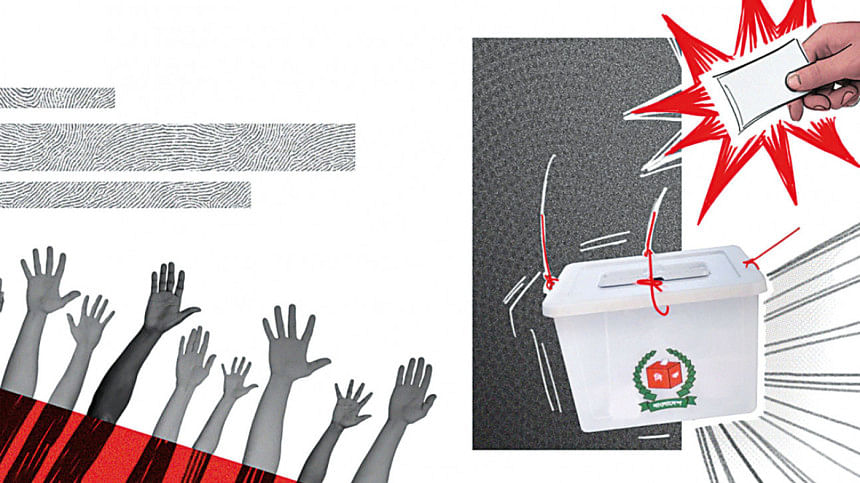The electoral landscape in Bangladesh has long been turbulent, shaped by entrenched political interests, systemic inefficiencies, and the persistent sidelining of citizens in governance decisions. The recent report by the Electoral Reform Commission offers a roadmap for a more inclusive and transparent electoral process. Yet, a closer examination reveals that it has a highly political actor-centric approach.
It appears to modernise governance, but fails to prioritise citizens at the heart of democracy. One of the most significant recommendations is creating an upper house of parliament with 100 seats, allocated proportionally based on votes received by political parties in parliamentary elections. On the positive side, this enhances proportional representation and provides a broader platform for diverse political voices.

However, internal party members will fill 50 percent of each party's allocated seats in the upper house. This would enable parties to nominate individuals who hold decision-making or administrative positions within their structure, such as party leaders, senior officials or active members. These members are typically aligned with the party's core interests and ideologies.
The remaining will be nominated from civil society, academia, labourers, and marginalised communities. However, the nomination process remains under party control, raising a critical questions: to what extent will these so-called "independent" representatives be free from partisan influence? This system creates a new avenue for political elites to manufacture legitimacy while maintaining their grip on power. A comparison with India's Rajya Sabha, where state legislative assemblies play a role in electing members, highlights the risks of political party domination.
Bangladesh's political context, characterised by a history of intense party polarisation and limited institutional checks and balances, makes this risk even more pronounced. Unlike India's relatively decentralised federal structure, Bangladesh's centralised political framework could increase the concentration of power in the hands of dominant parties, further marginalising the independent voices of citizens. Balancing these potential benefits and drawbacks is crucial for ensuring that this structural change serves the interests of citizens rather than those of the political elites.
Moreover, while the proposed 30 percent female representation among party and non-party nominees appears progressive, clear mechanisms for ensuring non-partisan female representation are lacking. A more comprehensive approach would involve establishing a citizen-led oversight body tasked with vetting and approving nominations. This body could be composed of non-partisan members from civil society, academia, and professional organisations, ensuring that selections are based on merit and diversity, rather than political loyalty.
The commission also proposes a "no vote" option, a recall mechanism, and a referendum system. While these initiatives enhance citizen participation as a part of direct democracy, their implementation raises serious concerns. The "no vote" option allows citizens to reject all candidates in an election.
If "no vote" won the majority, the election would be nullified, a fresh election would be held, and all previously rejected candidates would be barred from contesting again. This bold move aims to hold political parties accountable but carries significant political challenges. However, in Pakistan's 2018 general election, disqualification of prominent leaders like Nawaz Sharif increased political instability.
The absence of experienced political figures sometimes leaves a vacuum that is filled by candidates who are either less experienced or equally controversial, underscoring the need for more systemic reforms beyond individual disqualifications. Similarly, in parts of Eastern Europe, such as Hungary and Poland, bans and legal actions against opposition leaders resulted in the consolidation of power by ruling parties as new opposition figures struggled to gain traction amid state-controlled media and institutional biases. It suggests that disqualification without broader systemic reforms rarely guarantees better alternatives.
A more effective approach could involve introducing stricter candidate selection criteria, such as mandatory disclosure of political and financial histories, independent vetting panels, and greater input by citizens in the nomination process. Additionally, open debates would encourage the emergence of more qualified and accountable candidates. Meanwhile, the recall mechanism allows voters to remove an elected representative through a petition-based process and aims to enhance accountability.
Yet, initiating a recall and gathering signatures from one-third of the total voter list poses practical challenges. Because the effectiveness of this measure depends on the integrity of the electoral process, which remains compromised by intimidation, vote-buying, and weak institutional safeguards. Without genuine independence, this mechanism could be used by dominant parties to eliminate dissenting lawmakers, turning it into a political weapon.
The proposal to introduce a referendum provision is a valuable democratic tool, but the commission fails to outline clear guidelines for initiating and executing referendums in the report. These issues raise questions like who decides which issues qualify for a referendum. So, referendums could easily be co-opted by ruling parties to push their agenda under the guise of public endorsement.
To prevent this, clear and enforceable guidelines—including mandatory public consultations and transparent criteria for selecting issues eligible for referendums—are needed. Without these guidelines, this mechanism risks becoming a political gimmick. It seems evident from the electoral reform proposal that the upper house political parties would retain overwhelming control over nominations.
Similarly, the recall and referendum provisions remain vulnerable to partisan influence. While civil society actors are included in the proposed upper house, their selection by political parties could strip them of true independence, turning them into mere extensions of existing power structures. Dominant political factions could exploit mechanisms like referendums and recalls to silence opposition rather than empower voters.
Participatory mechanisms such as local citizen assemblies, independent oversight bodies, and open candidate selection processes could bring real change in such cases. Strengthening election monitoring bodies, free from government control, could enhance electoral integrity and restore voter confidence. The recent political climate presents a unique opportunity for reform.
However, by continuing to centre political actors rather than citizens, the report offers a blueprint for managed democracy. Despite its ambitious framing, the Electoral Reform Commission's report falls short of addressing the fundamental issues related to Bangladesh's existing electoral system, such as executive overreach, the politicisation of electoral bodies, and the lack of genuine grassroots participation. The report also did not address the Election Commission's (EC) independence, which leaves a crucial gap in pursuing free and fair elections.
Appointing election commissioners through a transparent, bipartisan process overseen by an independent body would enhance credibility. Moreover, establishing enforceable protocols for impartiality would ensure that the EC remains dedicated to upholding electoral integrity without succumbing to political pressures. Also, without proper steps to empower citizens and to strengthen institutional safeguards, the cycle of political upheaval will persist.
Bangladesh's democracy is still held hostage by the political actors. To break free from this cycle, it is important to prioritise true citizen empowerment through establishing independent oversight bodies, transparent electoral processes, and greater involvement of civil society. Without such collaborative efforts, democracy in Bangladesh will remain a performance, choreographed by political parties while ordinary citizens remain in the audience, watching but never truly participating.
Aishwarya Sanjukta Roy Proma is research associate at the BRAC Institute of Governance and Development (BIGD). Views expressed in this article are the author's own. Follow The Daily Star Opinion on Facebook for the latest opinions, commentaries and analyses by experts and professionals.
To contribute your article or letter to The Daily Star Opinion, see our guidelines for submission . The electoral landscape in Bangladesh has long been turbulent, shaped by entrenched political interests, systemic inefficiencies, and the persistent sidelining of citizens in governance decisions. The recent report by the Electoral Reform Commission offers a roadmap for a more inclusive and transparent electoral process.
Yet, a closer examination reveals that it has a highly political actor-centric approach. It appears to modernise governance, but fails to prioritise citizens at the heart of democracy. One of the most significant recommendations is creating an upper house of parliament with 100 seats, allocated proportionally based on votes received by political parties in parliamentary elections.
On the positive side, this enhances proportional representation and provides a broader platform for diverse political voices. However, internal party members will fill 50 percent of each party's allocated seats in the upper house. This would enable parties to nominate individuals who hold decision-making or administrative positions within their structure, such as party leaders, senior officials or active members.
These members are typically aligned with the party's core interests and ideologies. The remaining will be nominated from civil society, academia, labourers, and marginalised communities. However, the nomination process remains under party control, raising a critical questions: to what extent will these so-called "independent" representatives be free from partisan influence? This system creates a new avenue for political elites to manufacture legitimacy while maintaining their grip on power.
A comparison with India's Rajya Sabha, where state legislative assemblies play a role in electing members, highlights the risks of political party domination. Bangladesh's political context, characterised by a history of intense party polarisation and limited institutional checks and balances, makes this risk even more pronounced. Unlike India's relatively decentralised federal structure, Bangladesh's centralised political framework could increase the concentration of power in the hands of dominant parties, further marginalising the independent voices of citizens.
Balancing these potential benefits and drawbacks is crucial for ensuring that this structural change serves the interests of citizens rather than those of the political elites. Moreover, while the proposed 30 percent female representation among party and non-party nominees appears progressive, clear mechanisms for ensuring non-partisan female representation are lacking. A more comprehensive approach would involve establishing a citizen-led oversight body tasked with vetting and approving nominations.
This body could be composed of non-partisan members from civil society, academia, and professional organisations, ensuring that selections are based on merit and diversity, rather than political loyalty. The commission also proposes a "no vote" option, a recall mechanism, and a referendum system. While these initiatives enhance citizen participation as a part of direct democracy, their implementation raises serious concerns.
The "no vote" option allows citizens to reject all candidates in an election. If "no vote" won the majority, the election would be nullified, a fresh election would be held, and all previously rejected candidates would be barred from contesting again. This bold move aims to hold political parties accountable but carries significant political challenges.
However, in Pakistan's 2018 general election, disqualification of prominent leaders like Nawaz Sharif increased political instability. The absence of experienced political figures sometimes leaves a vacuum that is filled by candidates who are either less experienced or equally controversial, underscoring the need for more systemic reforms beyond individual disqualifications. Similarly, in parts of Eastern Europe, such as Hungary and Poland, bans and legal actions against opposition leaders resulted in the consolidation of power by ruling parties as new opposition figures struggled to gain traction amid state-controlled media and institutional biases.
It suggests that disqualification without broader systemic reforms rarely guarantees better alternatives. A more effective approach could involve introducing stricter candidate selection criteria, such as mandatory disclosure of political and financial histories, independent vetting panels, and greater input by citizens in the nomination process. Additionally, open debates would encourage the emergence of more qualified and accountable candidates.
Meanwhile, the recall mechanism allows voters to remove an elected representative through a petition-based process and aims to enhance accountability. Yet, initiating a recall and gathering signatures from one-third of the total voter list poses practical challenges. Because the effectiveness of this measure depends on the integrity of the electoral process, which remains compromised by intimidation, vote-buying, and weak institutional safeguards.
Without genuine independence, this mechanism could be used by dominant parties to eliminate dissenting lawmakers, turning it into a political weapon. The proposal to introduce a referendum provision is a valuable democratic tool, but the commission fails to outline clear guidelines for initiating and executing referendums in the report. These issues raise questions like who decides which issues qualify for a referendum.
So, referendums could easily be co-opted by ruling parties to push their agenda under the guise of public endorsement. To prevent this, clear and enforceable guidelines—including mandatory public consultations and transparent criteria for selecting issues eligible for referendums—are needed. Without these guidelines, this mechanism risks becoming a political gimmick.
It seems evident from the electoral reform proposal that the upper house political parties would retain overwhelming control over nominations. Similarly, the recall and referendum provisions remain vulnerable to partisan influence. While civil society actors are included in the proposed upper house, their selection by political parties could strip them of true independence, turning them into mere extensions of existing power structures.
Dominant political factions could exploit mechanisms like referendums and recalls to silence opposition rather than empower voters. Participatory mechanisms such as local citizen assemblies, independent oversight bodies, and open candidate selection processes could bring real change in such cases. Strengthening election monitoring bodies, free from government control, could enhance electoral integrity and restore voter confidence.
The recent political climate presents a unique opportunity for reform. However, by continuing to centre political actors rather than citizens, the report offers a blueprint for managed democracy. Despite its ambitious framing, the Electoral Reform Commission's report falls short of addressing the fundamental issues related to Bangladesh's existing electoral system, such as executive overreach, the politicisation of electoral bodies, and the lack of genuine grassroots participation.
The report also did not address the Election Commission's (EC) independence, which leaves a crucial gap in pursuing free and fair elections. Appointing election commissioners through a transparent, bipartisan process overseen by an independent body would enhance credibility. Moreover, establishing enforceable protocols for impartiality would ensure that the EC remains dedicated to upholding electoral integrity without succumbing to political pressures.
Also, without proper steps to empower citizens and to strengthen institutional safeguards, the cycle of political upheaval will persist. Bangladesh's democracy is still held hostage by the political actors. To break free from this cycle, it is important to prioritise true citizen empowerment through establishing independent oversight bodies, transparent electoral processes, and greater involvement of civil society.
Without such collaborative efforts, democracy in Bangladesh will remain a performance, choreographed by political parties while ordinary citizens remain in the audience, watching but never truly participating. Aishwarya Sanjukta Roy Proma is research associate at the BRAC Institute of Governance and Development (BIGD). Views expressed in this article are the author's own.
Follow The Daily Star Opinion on Facebook for the latest opinions, commentaries and analyses by experts and professionals. To contribute your article or letter to The Daily Star Opinion, see our guidelines for submission ..
Politics

Electoral reform in Bangladesh: A blueprint for change or a power play?

Electoral Reform Commission’s report falls short of addressing the fundamental issues related to Bangladesh’s existing electoral system.















